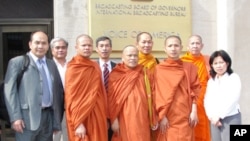Activists for the Khmer Kampuchea Krom have been asking for more help from US officials in what they say are rights abuses in Vietnam, but in a statement to VOA Khmer this week, the Vietnamese Embassy in Washington said their efforts amounted to “sabotage.”
“The purpose of distorting history and slandering Vietnam’s policy toward the Khmer community is to undermine our national solidarity and to sabotage the fine relationship between the S.R.Vietnam and the Kingdom of Cambodia,” the Vietnamese Embassy said in a statement to VOA Khmer.
The statement referred to a delegation of Khmer Krom to policymakers in Washington in recent weeks that included Tim Sakhorn, a monk who was imprisoned in Vietnam in 2007, and other monks and representatives.
The delegation is seeking a congressional hearing on their rights along with laws to protect ethnic Khmers in southern Vietnam, where they say rights to religion, education, land and other freedoms are limited by Vietnamese authorities.
In its statement, the Vietnamese Embassy said the government does not discriminate against the Khmer in the Mekong Delta, sometimes referred to in Cambodia as Kampuchea Krom, or Lower Cambodia.
“The Vietnamese State pursues a policy that ensures equality, unity and mutual assistance between and among these ethnic groups,” the embassy said. “Ethnic minorities including the Khmers are equally treated and receive due care from the State, which is trying its best to unceasingly improve their material and spiritual life including the needs of cultivation and housing land. Vietnamese laws ensure the right to freedom of beliefs and religions and freedom of non-beliefs or religion of all citizens.”
Thach Ngoc Thach, president of the US-based Khmer Kampuchea Krom Federation, who was also a member of the Washington delegation, urged Vietnam to open itself to a fact-finding mission between the UN, US, human rights groups and other diplomats.
“The Khmer Kampuchea Krom delegation also wants to visit Kampuchea Krom with an escort by the media and an international delegation to find out the truth, as we do not want to see mutual accusations,” he said.
Khmer Krom activists want Vietnam to publicly apologize for rights abuses there and to grant more freedom of religion to Khmers in Vietnam, who practice a different form of Buddhism than the Vietnamese.
The issue of the Khmer Krom is highly charged in Cambodia, where many are still rankled by the loss of the Mekong Delta from a former Cambodian empire to the Vietnamese.
Thach Ngoc Thach said the region should be recognized as formerly Cambodian, as evidenced by Khmer Krom temples in the delta.
The Vietnamese Embassy said the area “has been a part of Vietnamese territory for hundreds of years” and called the Khmers living there “an inseparable part of the community of 54 ethnic groups of Vietnam.”
Nevertheless, each year a number of Khmer Krom seek to flee Vietnam, and Human Rights Watch has said their religious freedoms are often restricted in Vietnam, where many Khmer Krom fought alongside the US in the Vietnam War.
Some 100 asylum seekers are currently in Thailand, where they are seeking protection. However, those like Leang Sokha, a 50-year-old monk, say they are living in deteriorating circumstances and are not always able to achieve asylum status with the UN’s refugee office.
“The reason that the UNHCR rejected my refugee status was because they first asked me what nationality I was, and where did I come from,” Leang Sokha told VOA Khmer by phone from Thailand. Without the proper documents, he was unable to answer them convincingly.
Leang Sokha said he had fled Vietnam after the authorities there asked him to watch members of his Khmer Krom community, jailing him when he refused. He declined a second offer and fled, he said.
A UNHCR representative in Washington referred Khmer Krom questions to the office in Bangkok. Officials there could not be reached for comment.
Another 25 Khmer Krom who have fled Vietnam are seeking protection in Cambodia, but they two face hardships, activists say.
Thach Ngoc Thach said Cambodian policies that would allow citizenship for Khmer Krom have many criteria, including a Cambodian residence, birth certificate as Khmer, Khmer parentage and other documents.
He said he was confidence US officials would take a closer look at the Khmer Krom issue.
Venerable monk Kim Moul, who was another member of the Washington delegation, told VOA Khmer in a recent interview that he hoped the US would follow up.
He said he and other monks were defrocked by Vietnamese authorities, imprisoned and monitored after they were freed.
“We all fled to Cambodia and they came to arrest us in Cambodia,” he said. “Until I fled to Thailand, then UNHCR sent me to Sweden.”




